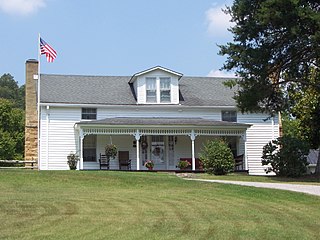
Sevierville is a city in and the county seat of Sevier County, Tennessee, located in eastern Tennessee. The population was 14,807 at the 2010 United States Census and 17,117 according to the 2019 census estimate.

William Alexander Graham was a United States Senator from North Carolina from 1840 to 1843, a Senator later in the Confederate States Senate from 1864 to 1865, the 30th Governor of North Carolina from 1845 to 1849 and U.S. Secretary of the Navy from 1850 to 1852, under President Millard Fillmore. He was the Whig Party nominee for vice-president in 1852 on a ticket with General Winfield Scott.

The National Register of Historic Places in the United States is a register including buildings, sites, structures, districts, and objects. The Register automatically includes all National Historic Landmarks as well as all historic areas administered by the U.S. National Park Service. Since its introduction in 1966, more than 90,000 separate listings have been added to the register.
This is a list of properties and historic districts in Tennessee that are listed on the National Register of Historic Places. There are over 2,000 in total. Of these, 29 are National Historic Landmarks. Each of Tennessee's 95 counties has at least one listing.

Memorial Park Cemetery was founded in 1924 by E. Clovis Hinds on initial 54 acres (.22 km2). It is located at 5668 Poplar Avenue in Memphis, Tennessee.
This is a list of the National Register of Historic Places listings in Knox County, Tennessee.

The President James K. Polk Home & Museum is the presidential museum for the eleventh president of the United States, James K. Polk, and is located at 301 West 7th Street in Columbia, Tennessee. Built in 1816, it is the only surviving private residence of United States President James K. Polk. It was designated a National Historic Landmark in 1961, and is listed on the National Register of Historic Places. As President Polk's primary historic site it is open daily for guided tours.

The Mallory–Neely House is a historic residence on 652 Adams Avenue in Memphis, Tennessee, USA. It is located in the Victorian Village district of Memphis. It has been identified as one of numerous contributing properties in the historic district.

The Magevney House is a historic residence on 198 Adams Avenue in Memphis, Tennessee, USA. It is located in the Victorian Village of Memphis and is listed on the National Register of Historic Places. It is one of the oldest residences remaining in Memphis.
The William Allison House near College Grove, Tennessee is an antebellum, brick central passage plan house with Federal style detailing built during 1827–1832. It is a two-story house with a two-story rear ell and exterior brick chimneys. It has a one-story shed-roof addition from c. 1860 and a c. 1940 porch.

The McGavock–Gaines House, also known as Riverside, is a historic mansion in Franklin, Tennessee. It was listed on the National Register of Historic Places in 1988. The property then included two contributing buildings, one contributing structure, and one non-contributing building, on an area of 3.2 acres (1.3 ha).

The Jordan–Williams House is an Italianate style house in Nolensville, Tennessee that was listed on the National Register of Historic Places in 1988.

The James Scales House, built c. 1885 in Kirkland, Tennessee, United States, along with the William W. Johnson House, another Williamson County house, are notable as late 19th century central passage plan residences that "display period decoration at eaves and porch." It includes Stick/Eastlake, I-house, and central passage plan architecture.

The James Bradley House is a historic house on a Southern plantation in Dixon Springs, Tennessee, United States.

The Smith Farmhouse is a historic house in Pasquo, Tennessee, USA.

The James Buchanan House is a historic log house in Nashville, Tennessee. It was built circa 1800 by James Buchanan, an early Nashville pioneer and signee of the 1789 Cumberland Compact, who built one of the earliest log homes in the area. This log house still stands today, open to the public, with its now-extinct ancient-forest American Chestnut and Tennessee Red Cedar logs with Tennessee Poplar floors on a Tennessee limestone foundation. It has been listed on the National Register of Historic Places since March 29, 1984.

The Benjamine Rucker House is a historic mansion in Rutherford County, Tennessee, U.S..

The Graham-Kivett House is a historic house in Tazewell, Tennessee. It was built of limestone around 1800 by William Graham, an immigrant from Ireland who co-founded of Tazewell. The house was designed in the Federal architectural style. By the turn of the 20th century, it belonged to William Yoakum, who sold it to James Kivett, a lawyer. It was inherited by his son, J. K. Kivett, who served as the county judge of Claiborne County until he was "convicted in December 1956 of taking four $1,000 county bonds to a Knoxville bank in June 1954 to obtain a personal loan of $5,400." The house remained in the Kivett family in the 1970s. It has been listed on the National Register of Historic Places since May 29, 1975.
















